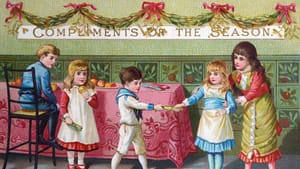Stay in the Loop
BSR publishes on a weekly schedule, with an email newsletter every Wednesday and Thursday morning. There’s no paywall, and subscribing is always free.
A small farewell to a fading institution: Why I still send Christmas letters
Who needs Christmas letters?

Christmas letters are a dying tradition. They're disappearing partly because Christmas cards themselves are a dying custom, but the rise of the Internet has played a role. An annual catch-up seems superfluous when you have so many year-round opportunities to stay in touch.
Many people will say good riddance. People who don't send Christmas letters are often happy to tell you how much they hate them. Comedians have lampooned them as egotistical exercises in self-promotion. Friends who were raised in very proper families have advised me that if you aren't willing to write someone a personal letter, you shouldn't write at all.
My wife and I never paid any attention to the last objection. We were both writers, so for us publication felt like a natural form of communication. Why spend hours scrawling the same news over and over again? Why shouldn't you spend a few of those hours honing your prose and producing multiple copies of the liveliest newsletter your brain can fashion?
Before the rise of electronic media, Christmas letters served an important social function. In a big country with a highly mobile population, they helped us maintain relationships that might have died out if we hadn't engaged in an annual exchange of news.
Reconnecting
I received a demonstration of their value every time someone I hadn't seen in years passed through Philadelphia and we picked up the relationship as if we'd been seeing each other once or twice a month. Our annual Christmas letters had been our only contact, but they had sufficed.
My Christmas letter may be an exercise in ego-projection (like all writing), but I like reading other people's Christmas letters, too. In addition to the news they contain, they're an annual opportunity to reinforce my connection with one of the fundamental truths of our existence.
The Japanese have a term, ukiyo-e— "the floating world." It refers to the world of fashion and light entertainment depicted in the woodblock prints that many of us love. To me, ukiyo-e also includes most of the events chronicled and endlessly analyzed by our modern news media.
Christmas letters are messages from the eternal reality that lies beneath the floating world. They focus on the timeless universe of marriages, births, careers, personal success, the steady advance of children from infancy to adulthood, and the inevitable realities of age and death.
Political messages
In the world of the Christmas letter, children and grandchildren play instruments in high school bands, blossom into future academic historians in college and assume responsible positions in banks and businesses. Their parents and grandparents cope with flooded basements and life-threatening medical developments. Aging parents must be cared for. Kitchens get remodeled. Trips get taken.
This being the United States— the great democracy in which every citizen is supposed to have an opinion on every aspect of public policy— some of the letters I receive contain brief comments on the unsatisfactory state of the world. Some correspondents even include references to our national frenzy over the perennial campaign to decide which politician will get to ride around in a helicopter and be saluted by a Marine.
I can usually skim past those deviations without excessive emotional effort. Presidents come and go. Celebrities cavort. The world stumbles from crisis to crisis.
Christmas letters have offered us a mild antidote to the preoccupation with public affairs encouraged by the relentless demands of the commercial news cycle— a gentle annual reminder that beneath the public hoopla, life does indeed go on.
Sign up for our newsletter
All of the week's new articles, all in one place. Sign up for the free weekly BSR newsletters, and don't miss a conversation.
 Tom Purdom
Tom Purdom